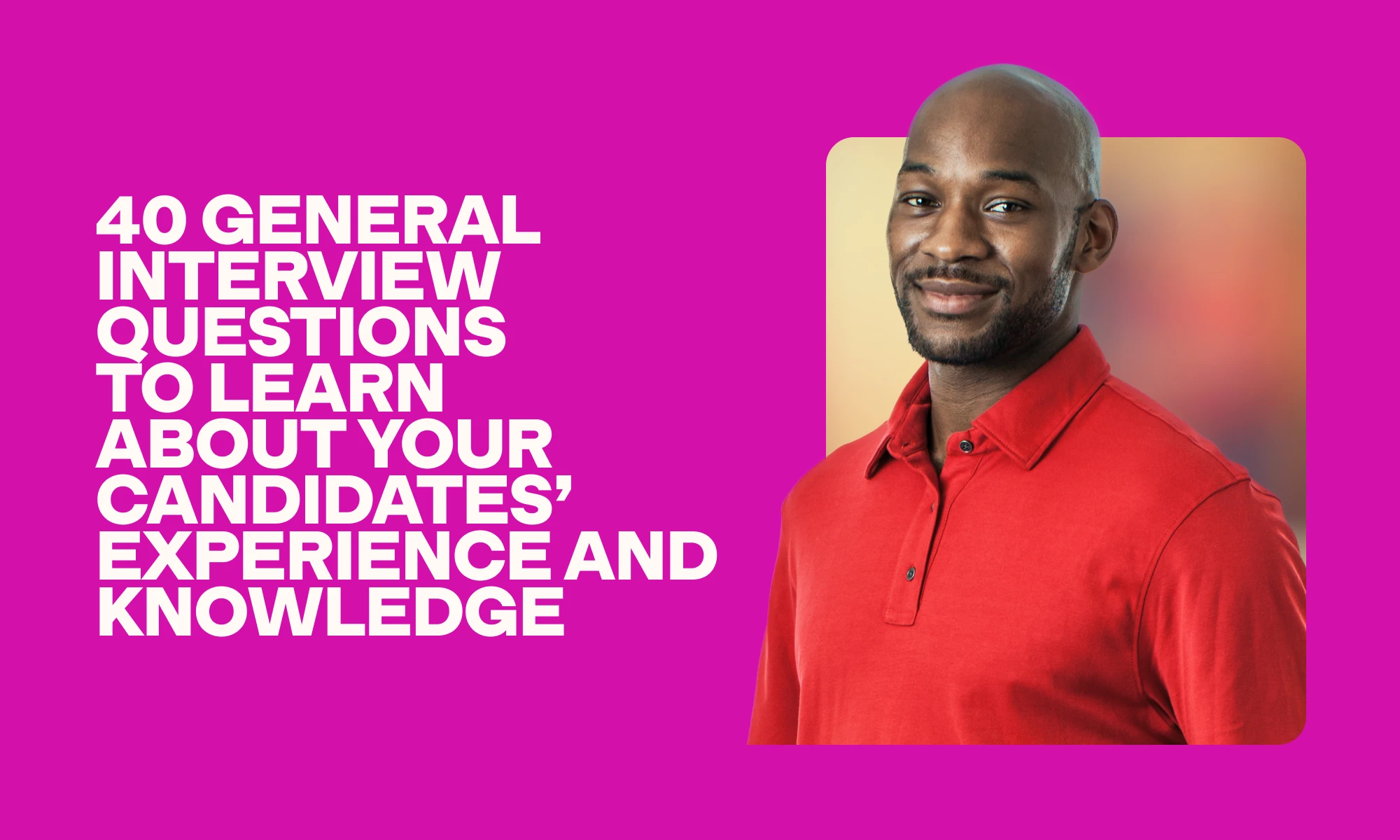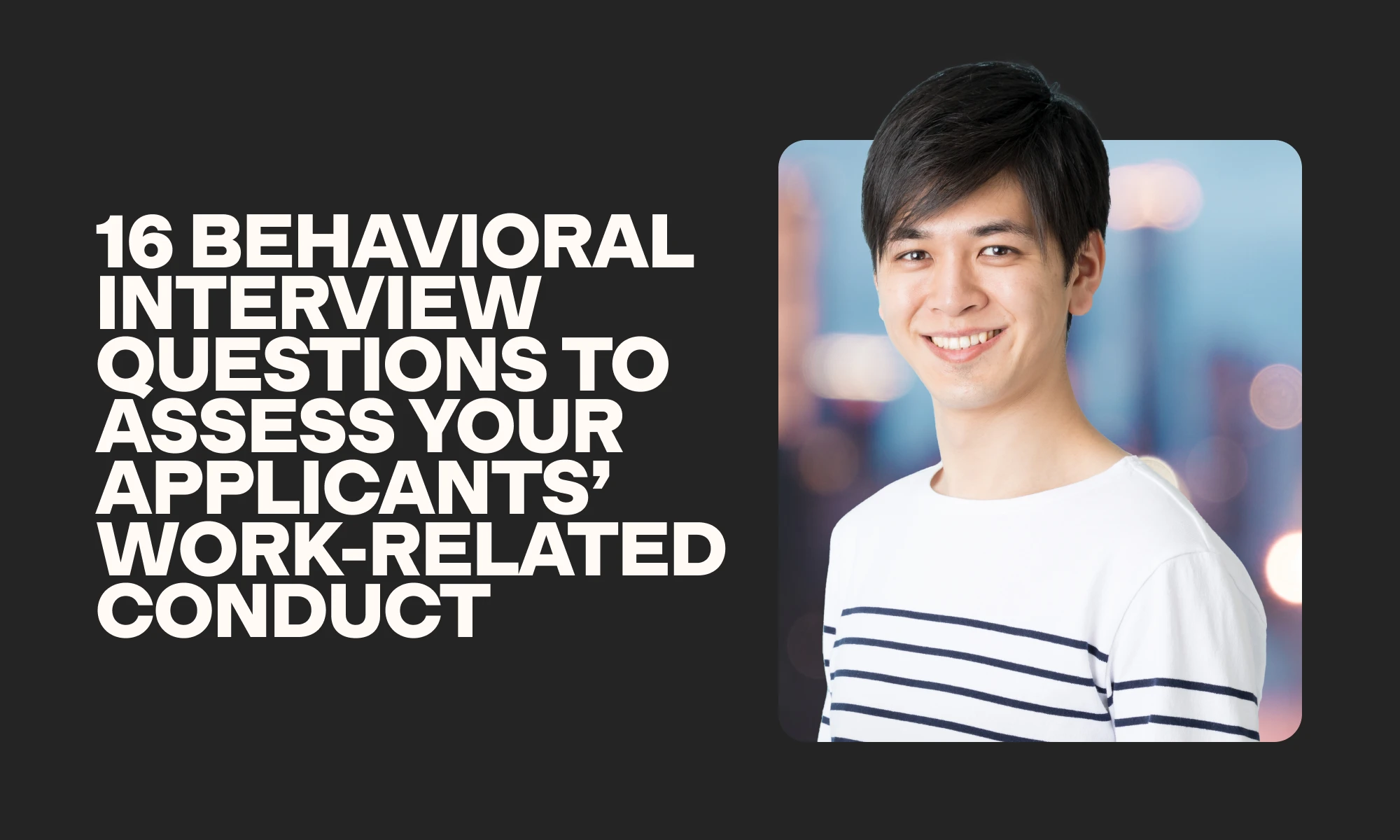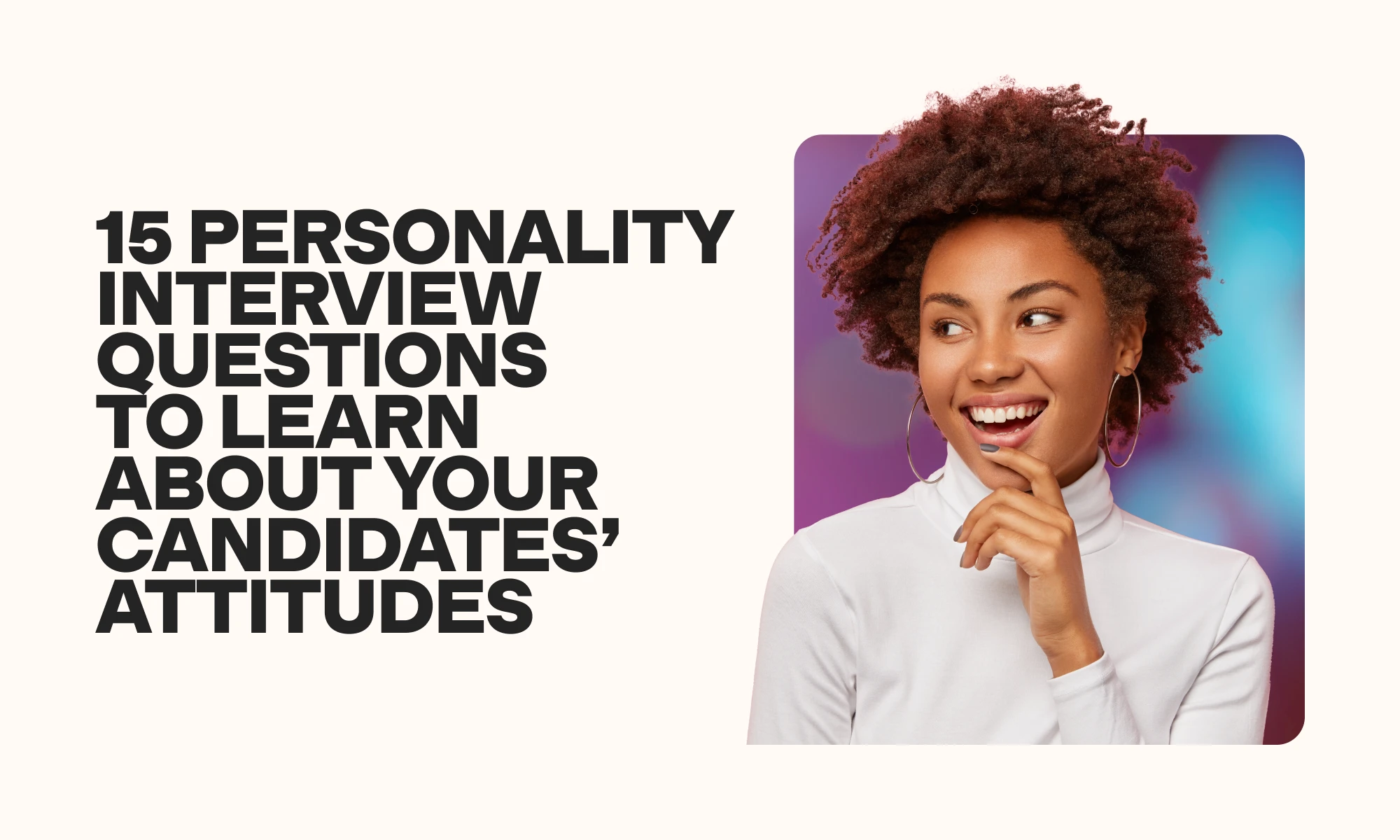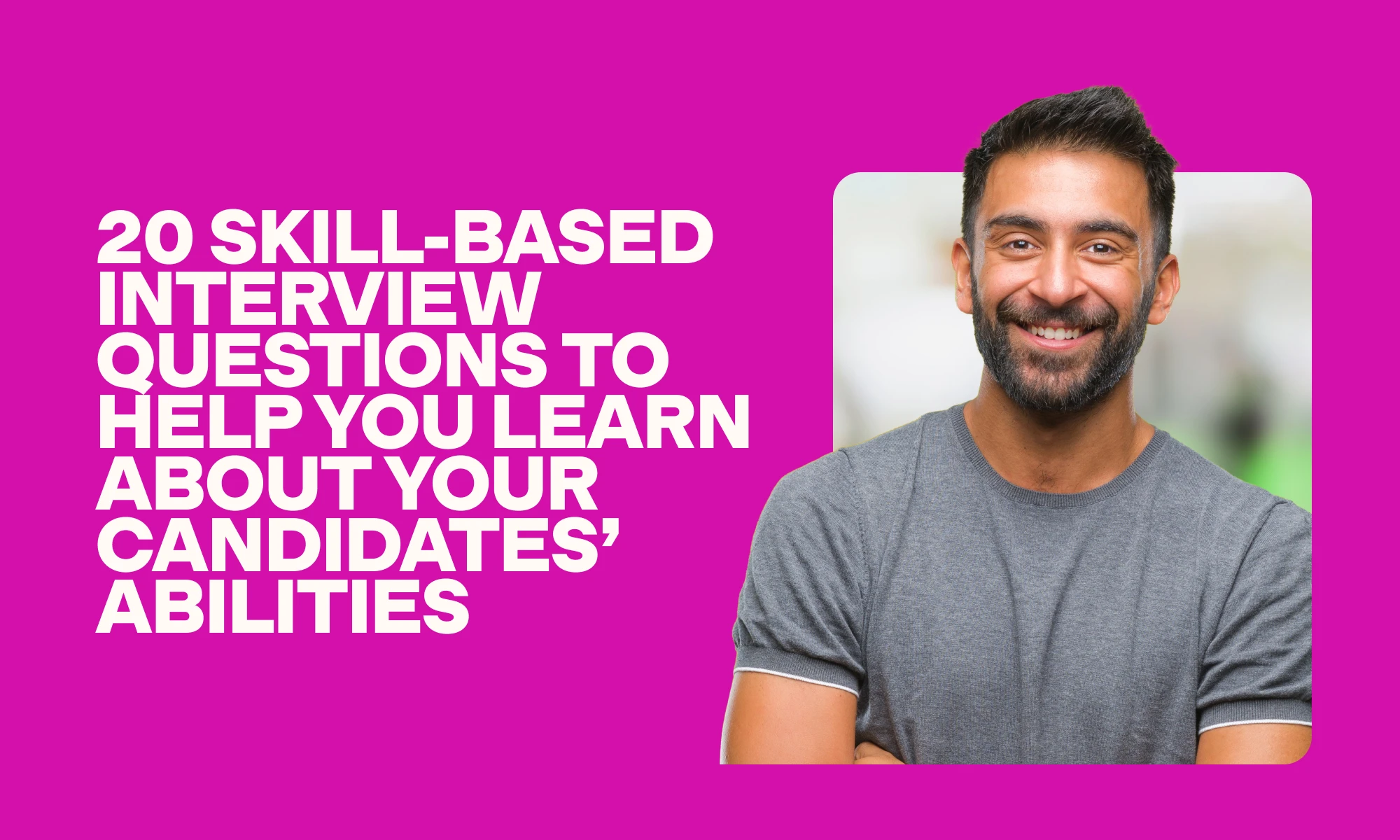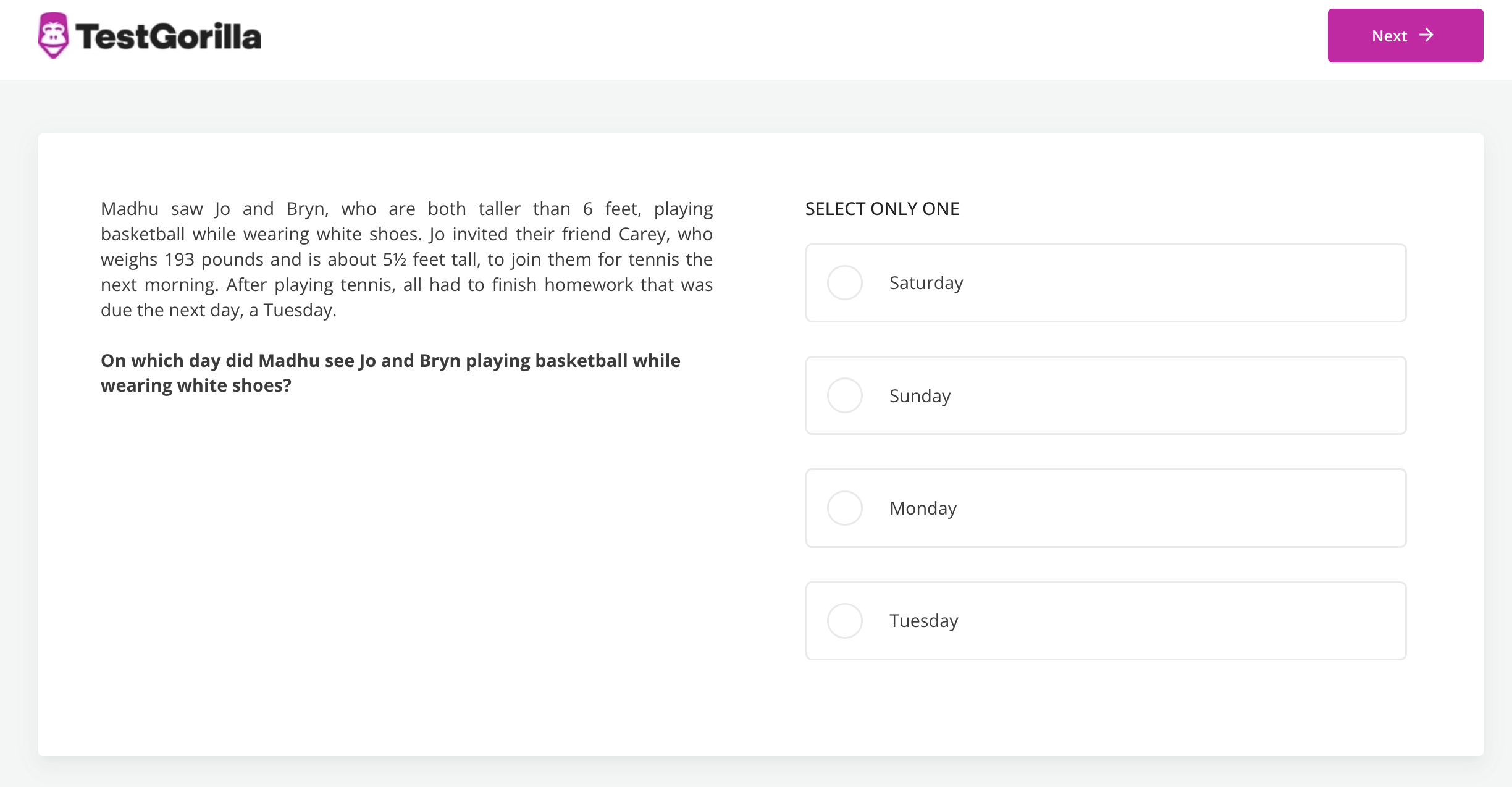100 interview questions to assess candidates and review their skills
Combine interview questions with skills testing to hire more objectively
Candidates expect interviews to be thorough and conversational, allowing them to show their knowledge and discuss relevant work experiences. A bad experience may drive away potential employees and even damage your company’s brand, so it’s important to make the interview process as smooth as possible.
The best way to lead an interview is to ask engaging questions, which may be about soft skills, personality traits, workplace behaviors, or general knowledge. For a winning, data-driven assessment method, you could also send candidates a Culture Add test before the interview to determine whether their values align with yours.
If you’re struggling to find the perfect questions, we have you covered. In this guide, you’ll find 100 interview questions to ask candidates, along with potential answers to help you evaluate their responses.
Table of contents
- 40 general interview questions to learn about your candidates’ experience and knowledge
- 10 general interview questions and sample answers
- 15 behavioral interview questions to assess your applicants’ work-related conduct
- 5 behavioral interview questions and sample answers
- 10 career-development interview questions to review goals and progression
- 5 career development interview questions and sample answers
- 15 personality interview questions to learn about your candidates’ attitudes
- 5 personality interview questions and sample answers
- 20 skill-based interview questions to help you learn about your candidates’ abilities
- 5 skill-based interview questions and sample answers
- At which stage of the hiring process should you use interview questions?
- Use the best skills assessments and interview questions to evaluate candidates objectively
40 general interview questions to learn about your candidates’ experience and knowledge
Below are some general interview questions to ask candidates to better understand their career goals, knowledge, and experience.
Tell me more about yourself and what you enjoy doing in your free time.
What are your strengths and weaknesses?
Are you willing to work from home if necessary?
What do you know about our company?
Where do you see yourself in five years?
Give one reason why you could succeed in this role.
Why are you interested in this particular industry?
Can you tell me about some of your career goals?
What are your salary expectations?
Why did you leave your last job?
How are you qualified for this role?
Why are you leaving your current position?
How would previous team members describe you?
What are your pet peeves in the workplace?
Tell me something that isn’t on your job application.
What motivates you to complete tasks?
What type of work environment do you prefer to be in?
Describe a common challenge you often face at work.
What are some of your proudest achievements?
How much training do you think you’ll need for this role?
Tell me a few facts about our company.
Are you willing to travel or relocate?
Do you have any plans for further education?
What is one word that describes you best?
Do you have a personal work style?
How did you find out about this job and did you find the application process easy?
Have you ever done volunteer work?
What is one thing you hope to achieve in this position?
Are you independent or do you prefer working as a team?
How could you add value to our company culture?
What are some of your hobbies?
How do you define success?
How do you think this industry will evolve in the next five years?
Are you willing to work extra hours when wrapping up important projects?
Describe a time when you had to take on more tasks.
What have you done over the past year to develop your skills?
Can you name some of your best skills?
Would you ever want to lead a team?
Has anything positively or negatively impacted your career in the past few years?
Do you have any questions for me?
10 general interview questions and sample answers
Check out the answers below to ten of the general interview questions. Use them to evaluate the candidate’s responses in greater detail.
1. Tell me more about yourself and what you enjoy doing in your free time.
This question can give you an insight into the candidate’s personality, their hobbies, and what they enjoy doing outside work. Simple questions like this one could help candidates feel more comfortable and at ease before you move on to more complex questions.
The candidate should share unique details about themselves that make them stand out in the hiring process.
A study by Adobe suggests that 78% of employees and managers care about positive work culture, meaning that assessing culture-add potential is an important aspect of the interview process. Questions like this one can help with this.
2. What do you know about our company?
Look for candidates who did their research before the interview: This shows they’re motivated to get the job. They should be able to tell you more about your company and industry and know some of your flagship products or services.
If they get stuck on this question, they might be unable to meet your company’s expectations.
3. How would previous team members describe you?
The candidate’s answer to this question should be detailed and honest.
They could focus more on their distinct personality traits or common workplace behaviors. Be wary of candidates who only mention positive traits; if they’re transparent, they should be able to find a balance between strengths and weaknesses when answering this question.
4. Tell me something that isn’t on your job application.
This is an excellent question to include in your interview because it will get the candidate thinking.
Candidates may discuss life experiences that influenced their career choices or personal interests that helped them to develop their skills. Use this question to better understand the candidate’s personality.
5. How do you think this industry will evolve in the next five years?
Candidates who stay up to date with recent developments in the industry are more knowledgeable and motivated. They understand the changes that could happen in their jobs, which may include the introduction of new technologies and the resulting profound transformations.
Top candidates will be able to discuss recent changes in the industry, give examples, and even mention stats to support their arguments and insights.
6. What have you done over the past year to develop your skills?
Consistent self-improvement shows great dedication. Even studying online at home proves that the candidate is motivated to refine their skills and grow.
Ideal candidates should always be aware of the skills they need to develop to progress in their careers. For example, a candidate might take programming courses to hone their software development skills.
You could send cognitive ability and personality tests to candidates before the interview to evaluate their general ability and willingness to learn new skills. Some potential tests include Critical Thinking and Motivation.
7. What are some of your proudest achievements?
This question gives candidates space to express their personalities and values.
They can talk about their career achievements and how a particular accomplishment influenced their personal development. The ideal candidate may also discuss achievements outside of work that boosted their confidence.
8. Can you tell me about some of your career goals?
An effective interview should always focus on the candidate’s goals. Learning about their short- and long-term goals can help you better understand their career path. This general question helps you see if they’re passionate to work in your industry.
9. Describe a common challenge you often face at work.
Candidates can use this question to discuss what they struggle with in the workplace. Some examples might be written communication or getting familiar with new software. Suitable candidates will be honest about their common struggles at work.
According to Gartner, organizations are preparing to tackle important challenges in 2023 and beyond by focusing on priorities such as change management and leadership effectiveness.
But are your candidates ready to face new challenges in the workplace, too, such as data security risks or disruptions related to AI advancement? Are they adaptable and ready to learn new skills?
On top of hiring the right people, you also need to consider whether you have suitable training programs in place to support them during onboarding.
10. Do you have a personal work style?
A candidate can use many different work styles into their routine. There is no right or wrong answer to this question, since work styles may largely depend on preference.
Below are some examples of work styles.
Leader: A leader knows how to inspire and guide a team. They have a vision and want to share it with team members during a big project.
Doer: The doer cares most about getting things done. This style means they stay driven and focused: Even when there isn’t that much to do, they’ll find a new challenge to work on.
Logical: It’s believed that employees who have a logical work style are linear thinkers. Knowing how to interpret data and constantly seeking self-improvement are some of their specialties.
Detail-oriented: Those who are thoughtful and methodical usually take the time to study the finer details in each project. They’re meticulous in their research and understand problems from both sides of the equation.
Supportive: High emotions can damage teams and projects, but there’s nothing wrong with offering support. This work style promotes collaboration, creates peace, and helps maintain relationships.
Idea-oriented: These big-picture thinkers are excited to take risks in a project. They use creativity and enthusiasm to guide others and make tasks exciting.
The best insights on HR and recruitment, delivered to your inbox.
Biweekly updates. No spam. Unsubscribe any time.
15 behavioral interview questions to assess your applicants’ work-related conduct
Here are 15 behavioral interview questions to ask candidates if you want to learn about their thought processes related to task completion, collaboration, and goal-setting.
Tell me about a time you used creativity to overcome a challenge.
What is your thought process after making a mistake at work?
How do you manage and prevent stress in a job?
Explain to me how you set long-term goals.
Have you ever made a decision that your team didn’t agree with? How did you handle it?
How do you communicate with an angry customer?
Describe a situation when you worked with someone you didn’t get along with.
What do you do if you can’t meet a deadline?
Tell me about a time you had to take charge and lead the team.
Has there ever been a time you went against the company’s policy? Why?
What is your task-prioritization process?
How do you consistently develop your skills?
Describe how you motivate other team members.
What is your approach to time management?
How do you respond to negative feedback?
5 behavioral interview questions and sample answers
Below, you’ll see five sample answers to some of the questions above. Use them to assess the candidates’ responses during the interview.
1. What is your thought process after making a mistake at work?
Your candidate should be able to explain their thought process behind resolving a mistake and preventing it from happening again. This helps you determine whether they have the right skills and mindset to perform complex tasks in the open position.
2. How do you respond to negative feedback?
Taking constructive criticism on board is essential in a job. Candidates need to be open to self-improvement to succeed at work.
Consider using a DISC personality test to better understand applicants’ thoughts and emotions when receiving feedback. DISC refers to four personality traits that are key in the workplace:
Dominance (D)
Influence (I)
Steadiness (S)
Conscientiousness (C)
3. Tell me about a time you had to take charge and lead the team.
This is one of the best interview questions for supervisors, managers, or leaders. It helps you assess whether the candidate is ready to develop and incorporate leadership skills into their work and take charge of a team.
Applicants’ awareness of their communication, listening, and problem-solving abilities as leaders is also important, so ask follow-up questions to learn more about these sub-skills.
In fact, leadership self-awareness gaps are common: While 48% of leaders have confidence in the quality of their company’s leadership, only 28% of HR professionals share that vision. This means it’s essential to hire people who are self-aware and willing to improve their skills constantly.
A Leadership and People Management test could also help you assess the candidate’s knowledge of delegation and on how to provide helpful feedback.
4. Have you ever made a decision that your team didn’t agree with? How did you handle it?
Here, expect strong candidates to talk about their ability to present ideas and persuade other team members to try them. Listen for signs that they know how to manage rejection in the workplace. If they don’t, it could be a sign that they aren’t emotionally ready for a demanding role.
5. What is your task-prioritization process?
The ideal candidate should have a task-prioritization method they’re able to explain clearly; this shows they’re able to plan tasks and complete them before the deadline.
For example, a candidate might use online calendar tools to organize their work and day-to-day tasks and improve their time-management skills.
10 career-development interview questions to review goals and progression
Consider using these career-development interview questions to delve into the candidate’s career vision and long-term aspirations.
What would you like to learn more about in this industry?
Do you plan on completing additional education?
Why did you start looking for a new job?
How do you want to progress in the next two years?
What skills would you like to learn in this role?
Can this position help you reach your goals?
Are you looking to climb the ladder in this company?
How do you plan on pursuing personal-development goals?
How do you sustain motivation for your chosen career path?
Do you have a dream job in mind?
5 career development interview questions and sample answers
Refer to these sample answers of some of the above career-development interview questions to better understand and evaluate candidates’ responses.
1. What would you like to learn more about in this industry?
Candidates interested in their chosen industry will always want to know more. They might ask questions regarding recent developments or ask you about your company’s digital transformation. This curiosity is healthy for candidates who want to prove themselves in the open position.
2. How do you want to progress in the next two years?
This question will tell you whether the candidate has clear career goals. Their answer should focus on upcoming training programs or future roles that would enable them to develop their skills.
Candidates with no plans for self-improvement may not have the determination to progress in your company. You may take this as a sign that they might not mesh well with other employees.
3. What skills would you like to learn in this role?
Candidates may not be proficient in every single aspect of their work. However, an ideal candidate will be honest about what skills they currently have and which ones they want to learn on the job.
Applicants may also mention how they would like to upskill, such as through mentoring or courses.
4. How do you plan on pursuing personal-development goals?
This question doesn’t have to relate only to their career, but strong candidates will have a plan on how they want to develop personally and will be eager to share it with you.
For example, some candidates may volunteer in their spare time to boost their confidence and gain new skills. Others may take part in different training initiatives or always be on the lookout for new challenges and opportunities to grow.
If you have a high-development culture (one of the key factors for better profitability and employee retention, according to Gallup), you need to hire people who have the determination to improve constantly.
5. Do you have a dream job in mind?
Not all candidates will have a dream job, but it helps to picture their career path and passions. How do their dreams align with your organization’s goals?
For example, a candidate may have the desire to work for one of the top video game companies in the future, while another might dream about working for a global leader in fashion.
Others might be excited about the prospect of assuming a leadership role in the future or training new employees.
15 personality interview questions to learn about your candidates’ attitudes
Use our list of personality interview questions to learn more about each candidate’s attitudes to work and how they present their views.
Do you prefer working in a team or on your own?
What are you most passionate about?
What methods do you use to reduce stress?
How do you limit distractions at work?
What’s your favorite book?
What are some of your hobbies and interests?
How would your previous colleagues describe you?
What superhero would you want to be and why?
Do you view yourself as a detail-oriented person?
How do you handle pressure at work?
Describe your personality using only three words.
Tell me about a creative way you have taken feedback on board.
What one trait makes you stand out from other candidates?
Do you believe you’re an introvert or an extrovert?
If you could rewind time to prevent a mistake at work, what would it be?
5 personality interview questions and sample answers
Below are some sample answers to the personality interview questions from the previous section. Use them to assess your candidates’ responses.
1. Do you prefer working in a team or on your own?
This question helps you determine whether the candidate works better alone or if they’re a strong collaborator. There is no correct answer, but jobs requiring teamwork may not suit those who prefer working independently.
You can also use the Enneagram Personality test to understand candidates’ views on collaboration or even explore dynamics in existing teams.
2. What are some of your hobbies and interests?
You should become acquainted with candidates to make them feel more comfortable during the interview.
Taking interest in a candidate’s hobbies can help them relax and be more at ease when answering more challenging questions. And, if their hobbies align with their dream job, it shows their passion for the industry and their motivation to grow.
3. How do you handle pressure at work?
Hiring candidates who are able to work under pressure can be very beneficial for the team as a whole.
Suitable candidates should have experience with tackling demanding tasks and meeting tight deadlines. This question also enables you to learn more about how they handle high emotions in the workplace.
Prior to interviews, you can use the Big 5 (OCEAN) test to gain insights into the candidate’s personality. This test enables you to evaluate an applicant’s openness, conscientiousness, extroversion, agreeableness, and emotional stability.
4. Tell me about a creative way you have taken feedback on board.
Creativity is not a must for all roles, but it can be an important skill for jobs where employees need to often come up with new solutions to problems.
Regarding feedback, your candidate might use creative methods to implement constructive criticism into their work. For example, they could create a fun to-do list with all the things they’ll do to improve their skills, knowledge, and time management.
Aim to find a candidate who is innovative and determined to improve their skills – and also to create a culture of creativity. According to PwC, 60% of employees say that the opportunity to be creative at their workplace is an important factor when changing jobs.
5. Do you view yourself as a detail-oriented person?
Detail-oriented people are usually more accurate and productive when completing tasks. Candidates should be able to give examples of common practices that they use to ensure they’re precise and meticulous in their work.
To learn even more about their skills, you can send them an Attention to Detail test. You can also use the 16 Personalities test to better understand the candidate’s personality traits and work preferences.
20 skill-based interview questions to help you learn about your candidates’ abilities
This comprehensive list features skill-based interview questions to help you understand your candidate’s abilities and knowledge.
How would you organize a last-minute project?
Tell me about a time you had to discuss a problem.
What is your leadership style?
How do you handle sudden changes to your routine?
Give me an example of when you pitched an idea to your team.
Have you ever made a tough decision at work? How did you make it?
How do you fix errors in your work and prevent them from happening again?
Talk me through your thought process when starting a new project.
How do you keep your composure and stay patient when dealing with conflict?
What steps do you take to prevent miscommunication?
How do you turn a negative situation into a positive one?
Tell me about a time you caught a mistake that other team members hadn’t noticed.
How do you keep track of multiple deadlines?
Are you able to delegate responsibilities when necessary?
How would you boost morale in the team?
Talk me through a problem you’ve faced and how you solved it.
How do you learn new tasks in a short amount of time?
What do you do if a team member is not completing their tasks?
How do you absorb new information regarding a project?
Do you use any online resources to help with your tasks?
5 skill-based interview questions and sample answers
Refer to the sample answers to five of the interview questions above to efficiently assess your applicants.
1. Tell me about a time you had to discuss a problem.
Communication skills are necessary for building professional relationships and maintaining strong collaboration. The ideal candidate should know about the different communication types and how to best relay a problem to managers or team members.
It’s important that job applicants have a strong professional etiquette when working with others; check your applicants’ skills using a Communication skills test to learn more.
2. How do you handle sudden changes to your routine?
Being able to adapt to change is an essential skill in the workplace. Candidates who are highly adaptable can take on additional tasks and responsibilities and evolve with the company rather than fall behind.
Look for candidates who are able to provide specific examples of how they changed their routine to meet new demands.
3. Tell me about a time you caught a mistake that other team members hadn’t noticed.
Noticing finer details can prevent errors from accumulating and having a snowball effect. Candidates with strong analytical skills might spend more time on tasks but be more thorough in their work.
When answering this question, the candidate should discuss common mistakes they’ve found in the past and how they addressed them.
Consider using a Textual Attention to Detail test (preview of sample question below) to see whether candidates are able to manage intricate processes and check the consistency of information.
4. Do you use any online resources to help with your tasks?
Candidates who take the initiative to study using different online resources may be more motivated and committed to self-improvement. Some resources they may use are virtual training sessions, workshops, courses, or reading materials.
To learn more about their willingness to grow, send them a Motivation test before the interview. This test uncovers more of the candidate’s personality and whether their expectations align with your company’s mission.
5. How do you keep track of multiple deadlines?
This question enables candidates to show their time management skills and the organization methods they’re using in the workplace. It also helps you determine whether they can meet deadlines and work in a demanding role.
Strong applicants will give you real examples of how they’ve managed their time in previous jobs.
Research shows that 88% of employees procrastinate daily, leading to missed deadlines and poor productivity. Hiring the right candidates ensures they are efficient when it comes to completing projects.
A Time Management test is key to identifying the candidate’s organization skills. The results will show you how well your candidates plan their time and workload.
At which stage of the hiring process should you use interview questions?
We recommend you use interview questions after skill assessments. This approach ensures you’re interviewing suitable applicants who can perform tasks successfully – and that you’re not wasting time with candidates who simply aren’t qualified for the open role. This makes your shortlisting process more efficient and objective.
With skills tests, all candidates answer the same questions and have the same time to complete them, so using this method to evaluate their skills helps you eliminate bias.
Make sure to choose skill tests that are relevant and challenging. This enables you to test the candidates’ knowledge, work experience, and prominent skills before the interview.
Roll out tests, track results, and make hiring decisions from an intuitive, unified platform.
Use the best skills assessments and interview questions to evaluate candidates objectively
To make your hiring process more efficient and recruit the best candidates, combine interviews with skills tests.
So, before using the above list of interview questions, head to TestGorilla’s extensive test library to build a comprehensive skill assessment to evaluate candidates’ suitability for your open role and shortlist those who show the most promise.
For the best results, pick tests in line with the requirements of the role; for example, the Customer Service test is best for customer-centric roles, while the Product Management test is ideal for jobs in the product team.
With more than 350+ available tests in 11 languages, TestGorilla has everything you need to identify qualified candidates. Get started with our free plan today and see for yourself how easy it can be to hire the best.
You've scrolled this far
Why not try TestGorilla for free, and see what happens when you put skills first.



